2017 年 11 月国家开发银行招聘笔试真题及答案
第一部分 英语测试
一、选词填空
1. The students in the dormitories were forbidden, unless they had special
passed,____ after 11 pm.(
D )
A. staying out B. stay out
C. from staying out D. to stay out
2. Because of the bad food he had eaten, his stomach began to ____.(
C )
A. pain B. be hurt C. ache
D. harm
3. While in bed the doctor was telephoned to go back to the hospital because
of ____case. (
D )
A. a treatment B. an operation C. an incident D. an emergency
4. “Who won the election for mayor?” (
D )
“A man____to represent every minority group in the city.”
A. claim B. is claimed
C. claimed D. claiming
5. That’s definitely not what I said. You are purposely ____my idea to prove
your point. (
C )
A. revising B. distracting C. distorting D. contradicting
6. It is a common theme in many science fiction stories that the world may one
day be ____by out space invaders. ( B
)
A. broken in
B. taken over
C. run over
D. filled in
7. Returning to my apartment____.(
C )
A. my watch was missing
B. I found my watch disappeared
C. I found my watch
missing
D.the watch was missed
8. Just remember one thing that____decisions often lead to bitter regrets.
(
A )
A. hasty
B. prompt
C. urgent
D. instant
9. "Where’s my cap?"
"It’s on the ____."(
A )
�
A. kitchen counter
B. kitchen’s counter
C. counter of the kitchen
D.
counter for the kitchen
10. When he was driving home, he was stopped by the policeman and was ____ of
speeding. (
C )
A. charged
B. blamed
C. accused
D. warned
11. My niece has been to Sumatra and Iran as well as all of Europe. By the time
shes twenty, she____almost everywhere.( C
)
A. will be
B. would have been
C. will have been
D. would be
12. When workers push together to organize themselves in trade unions, employers
find it hard to lay them ____.(
A )
A. off
B. aside
C. out
D. down
13. I’d rather you____ anything about it for the time being. (
D )
A. do
B. didn’t do
C. don’t
D. didn’t
14. We must ____that the procedure is followed as rigidly as possible. (
B )
A. secure B. ensure C. assure D. issue
15. I spoke to him kindly____ him. ( B
)
A. not to frighten
B. so as not to frighten
C. in order to not frighten
D.
for not frightening
16. Outside my office window there is a fire ____ on the right.( A
)
A. escape B. ladder C. steps D. stairs
17. I ____with the Browns during my stay in New York City. ( D
)
A. put in B. put down C. put on D. put up
18. Operations which left patients ____ and in need of long periods of discovery
time now leave them feeling relaxed and comfortable. ( A
)
A. exhausted B. unhealthy C. upset D. fearful
19. Farmers are allowed to grow small gardens of their own and they sell their
vegetables ____ the black market. ( A
)
A. on B. at C. in D. for
20. The electric fan does not work because of the ____of service. (
C )
A. pause B. break C. interruption D. breakdown
�
二、完形填空题
In families with two working parents, fathers may have more impact ____21____ a
child’s language development than mothers, a new study ____22____.
Researchers ____23____ 92 families from 11 child care centers before their
children were a year old, interviewing each to establish income, ____24____ of
education and child care arrangements. ____25____, it was a group of well-educated
middle-class families, ____26____ married parents both living in the home.
When the children were 2, researchers videotaped them at home in free-play
sessions with both parents, recording all of their ____27____. The study will appear
in the November ____28____ of The Journal of Applied Developmental Psychology.
The scientists ____29____ the total number of utterances of the parents, the
number of different words they used, the ____30____ of their sentences and other
aspects of their speech. ____31____ average, fathers spoke less than mothers did,
but they did not ____32____ in the length of utterances or proportion of questions
asked.
Finally, the researchers ____33____ the children’s speech at age 3, using a
standardized language test. The only predictors of high ____34____ on the test were
the mother’s level of education, the ____35____ of child care and the number of
different words the father used.
The researchers are ____36____ why the father’s speech, and not the mother’
s, had an effect. “It’s well ____37____ that the mother’s language does have an
impact,” said Nadya Pancsofar, the lead author of the study. “It ____38____ be
that the high-functioning mothers in the study had already had a strong in? uence
____39____ their children’s speech development, or it may be that mothers are
____40____ in a way we didn’t measure in the study.”
21. A. in B. at C. on D. with
(
C
)
22. A. reports B. informs C. assumes D. suggests(
D )
23. A. appointed B. recruited C. enrolled D. admitted(
B )
24. A. level B. standard C. years D. degree(
A
)
25. A. Moreover B. Overall C. In all D. Luckily(
B )
�
26. A. and B. or C. with D. without(
C )
27. A. speech B. action C. expression D. response(
A )
28. A. publication B. version C. edition D. issue(
D
29. A. recorded B. measured C. included D. estimated(
)
B
)
30. A. simplicity B. complexity C. easiness D. dif? culty(
B
)
31. A. On B. In C. For D. At( A
)
32. A. change B. speak C. differ D. specialize(
C )
33. A. videotaped B. predicted C. compared D. analyzed(
D )
34. A. values B. scores C. standards D. qualities(
B )
35. A. effect B. intensity C. quality D. strength(
C
)
36. A. aware B. unaware C. sure D. unsure(
D
)
37. A. understood B. constituted C. established D. informed(
C
)
38. A. should B. could C. had to D. used to(
B
)
39. A. with B. in C. at D. on(
D )
40. A. contributing B. cultivating C. instructing D. enlightening(
A
)
三、阅读理解
Text 1
I have known very few writers, but those I have known, and whom I respected, confess
at once that they have little idea where they are going when they first set pen to
paper. They have a character, perhaps two; they are in that condition of eager
discomfort which passes for inspiration; all admit radical changes of destination
once the joumey has begun; one, to my certain knowledge, spent nine months on a novel
about Kashmir, then reset the whole thing in the Scottish Highlands. I never heard
of anyone making a "skeleton", as we were taught at school. In the breaking and
remaking, in the timing, interweaving, beginning afresh, the writer comes to discern
things in his material which were not consciously in his mind when he began.
This organic process, often leading to moments of extraordinary self-discovery,
is of an indescribable fascination. A blurred image appears, he adds a brushstroke
and another, and it is gone; but something was there, and he will not rest till he
�
has captured it. Sometimes the’ yeast within a writer outlives a book he has written.
I have heard of writers who read nothing but their own books, like adolescents they
stand before the mirror, and still cannot fathom the exact outline of the vision
before them. For the same reason, writers talk interminably about their own books,
winkling out hidden meanings, superimposing new ones, begging response from those
around them.
Of course a writer doing this is misunderstood: he might as well try to explain
a crime or a love affair. He is also. Incidentally, an unforgivable bore. This
temptation to cover the distance between himself and the reader, to study his image
in the sight of those who do not know him, can be his undoing: he has begun to write
to please.
A young English writer made the pertinent observation a year or two back that
the talent goes into the first draft, and the art into the drafts that follow. For
this reason also the writer, like any other artist, has no resting place, no crowd
or movement in which he may take comfort, no judgment from outside which can replace
the judgment from within. A writer makes order out of the anarchy of his heart; he
submits himself to a more ruthless discipline than any critic dreamed of, and when
he flirts with fame, he is taking time off from living with himself, from the search
for what his world contains at its inmost point.
41. The writers that the author is familiar with confess that they would( D
)
A. work out the ending of a novel in advance.
B. follow the writing methods learned at school.
C. remodel the main character in writing.
D. make changes to the stories they first construct.
42. According to the passage, the process of writing(
D )
A. depends on skillful planning.
B. is predictable and methodological.
C. depends on the writers’ experiences.
D. is disorderly and unsystematic.
43. The word "undoing" in the third paragraph probably suggests( C
)
�
A. success.
B. happiness.
C. failure.
D. sorrow.
44. According to the passage, the writer has no resting place because( B
)
A. he is not clear about what he will write at the beginning.
B. he should constantly edit his work to make it perfect.
C. he has to face a lot of responses given by readers.
D. he should add brushstrokes to the appearing blurred images.
45. Which of the following statements about writers is TRUE according to the
last paragraph? (
C )
A. They have little ideas before they start writing.
B. Their talent goes into all their drafts.
C. It does harm to their writing when they flirt with fame.
D. They try to increase communication with readers.
Text 2
The simple act of surrendering a telephone number to a store clerk may not seem
harmful--so much so that many consumers do it with no questions asked. Yet that one
action can set in motion a cascade of silent events, as that data point is acquired,
analyzed, categorized, stored and sold over and over again. Future attacks on your
privacy may come from anywhere, from anyone with money to purchase that phone number
you surrendered. If you doubt the multiplier effect, consider your e-mail inbox.
If it's loaded with spam, it's undoubtedly because at some point in time you
unknowingly surrendered your e-mall to the wrong Web site.
Do you think your telephone number or address is handled differently? A cottage
industry of small companies with names you've probably never heard of--like Acxiom
or Merlin--buy and sell your personal information the way other commodities like
corn or cattle futures are bartered. You may think your cell phone is unlisted, but
if you've ever ordered a pizza, it might not be. Merlin is one of many commercial
�
data brokers that advertises sale of unlisted phone numbers compiled from various
sources--including pizza delivery companies. These unintended, unpredictable
consequences that flow from simple actions make privacy issues difficult to grasp,
and grapple with.
In a larger sense, privacy also is often cast as a tale of "Big Brother"--the
government is watching you or An big corporation is watching you. But privacy issues
don’t necessarily involve large faceless institutions: A spouse takes a casual
glance at her husband's Blackberry, a co-worker looks at e-mall over your shoulder
or a friend glances at a cell phone text message from the next seat on the bus. while
very little of this is news to anyone--people are now well aware there are video
cameras and Internet cookies everywhere--there is abundant evidence that people live
their lives ignorant of the monitoring, assuming a mythical level of privacy. People
write e-mails and type instant messages they never expect anyone to see. Just ask
Mark Foley or even Bill Gates, whose e-mails were a cornerstone of the Justice
Department's antitrust case against Microsoft.
And polls and studies have repeatedly shown that Americans are indifferent to
privacy concerns. The general defense for such indifference is summed up a single
phrase: "I have nothing to hide." If you have nothing to hide, why shouldn't the
government be able to peek at your phone records, your wife see your e-mail or a
company send you junk mail? It's a powerful argument, one that privacy advocates
spend considerable time discussing and strategizing over.
It is hard to deny, however, that people behave different when they're being
watched. And it is also impossible to deny that Americans are now being watched more
than at any time in history.
46. In the first paragraph, the telephone number is cited to show(
C )
A. many customers didn't keep their privacy confidential.
B. it is harmful to give a store clerk a telephone number.
C. careless disposal of personal information can be harmful.
D. customers should inquire its use when giving telephone numbers to others.
47. What do companies like Acxiom and Merlin do? ( B
)
�
A. Compile telephone directories for businessmen.
B. Collect and sell personal information to make a profit.
C. Trade commodities like corn on the market.
D. Crack down crimes like stealing private information.
48. From Paragraph 3, we learn that( D
)
A. cases of privacy intrusion happen only in large institutions.
B. people are quite aware of how their privacy is intruded.
C. it is not privacy intrusion when a wife glances at her husband's cell phone.
D. Bill Gates' email messages were cited as evidence against him.。
49. It can be inferred from the fourth paragraph that the author thinks( A
)
A. Americans are actually concerned about privacy issues.
B. Americans are indifferent to privacy concerns.
C. Americans are very frank about privacy concerns.
D. Americans are puzzled about privacy concerns.
50. Which of the following is the author's viewpoint? (
B )
A. Never give your private information to anyone.
B. People should pay more attention to their privacy issues.
C. Do not surrender your email to any website.
D. It does no good saying "I have nothing to hide".
Text 3
There are many theories about the beginning of drama in ancient Greece. The one
most widely accepted today is based on the assumption that drama evolved from ritual.
The argument for this view goes as follows. In the beginning, human beings viewed
the natural forces of the world, even the seasonal changes, as unpredictable, and
they sought through various means, to control these unknown and feared powers. Those
measures which appeared to bring the desired results were then retained and repeated
until they hardened into fixed rituals. Eventually stories arose which explained
or veiled the mysteries of the rites. As time passed some rituals were abandoned,
�
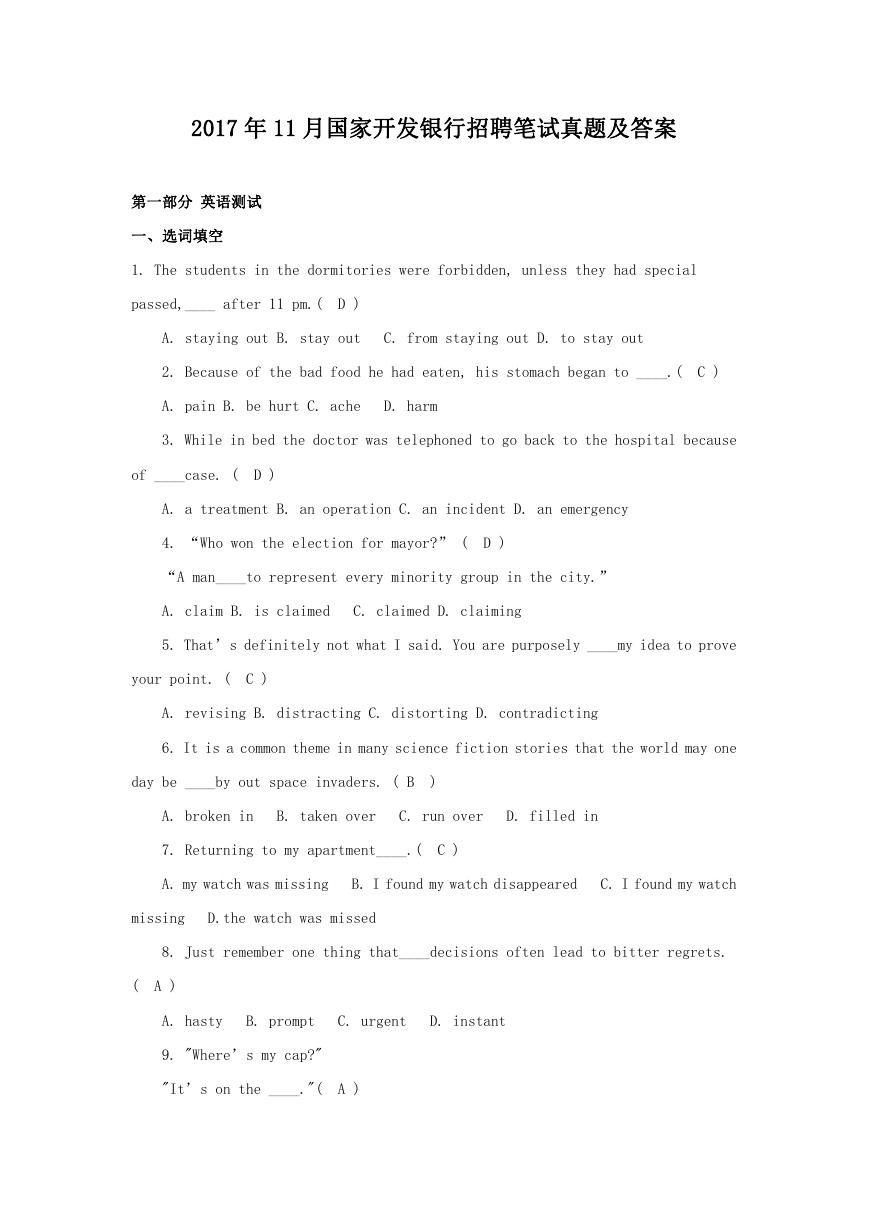
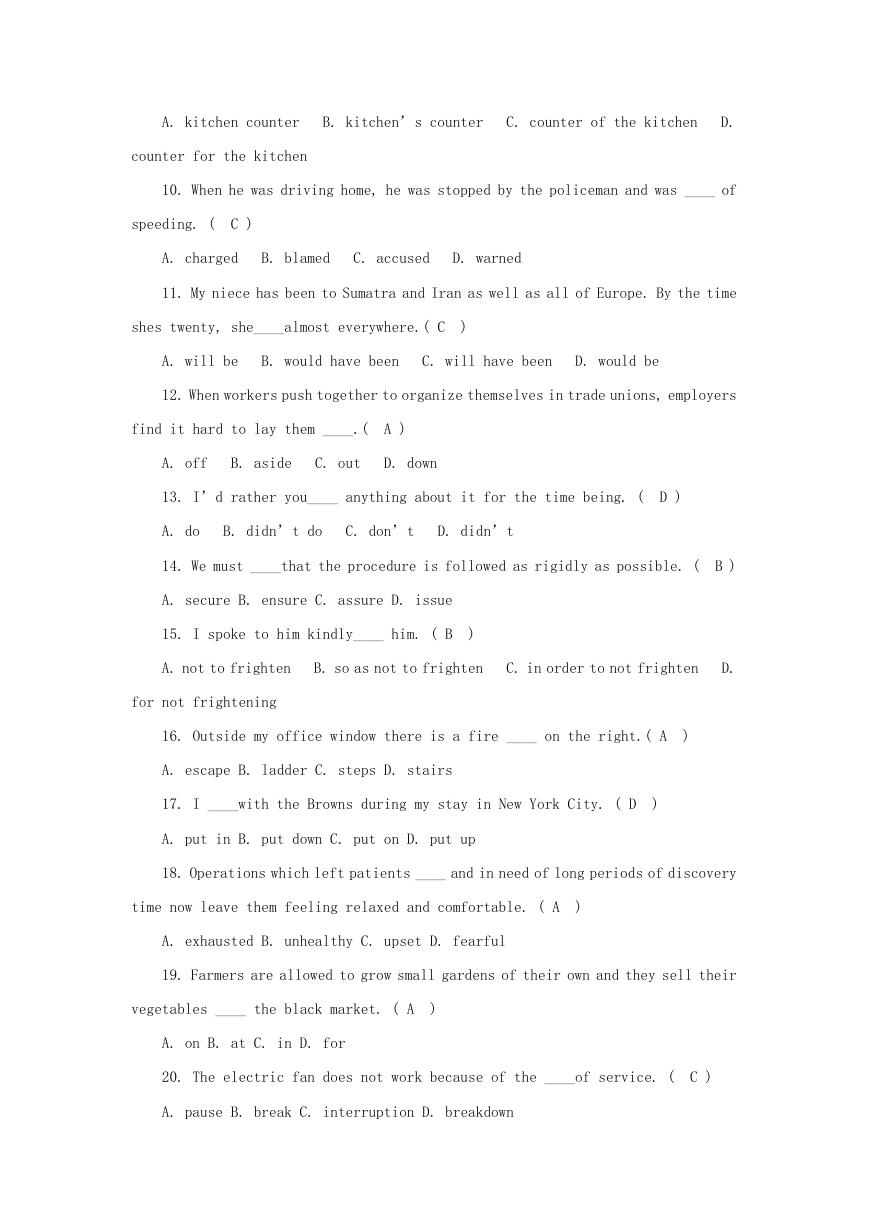
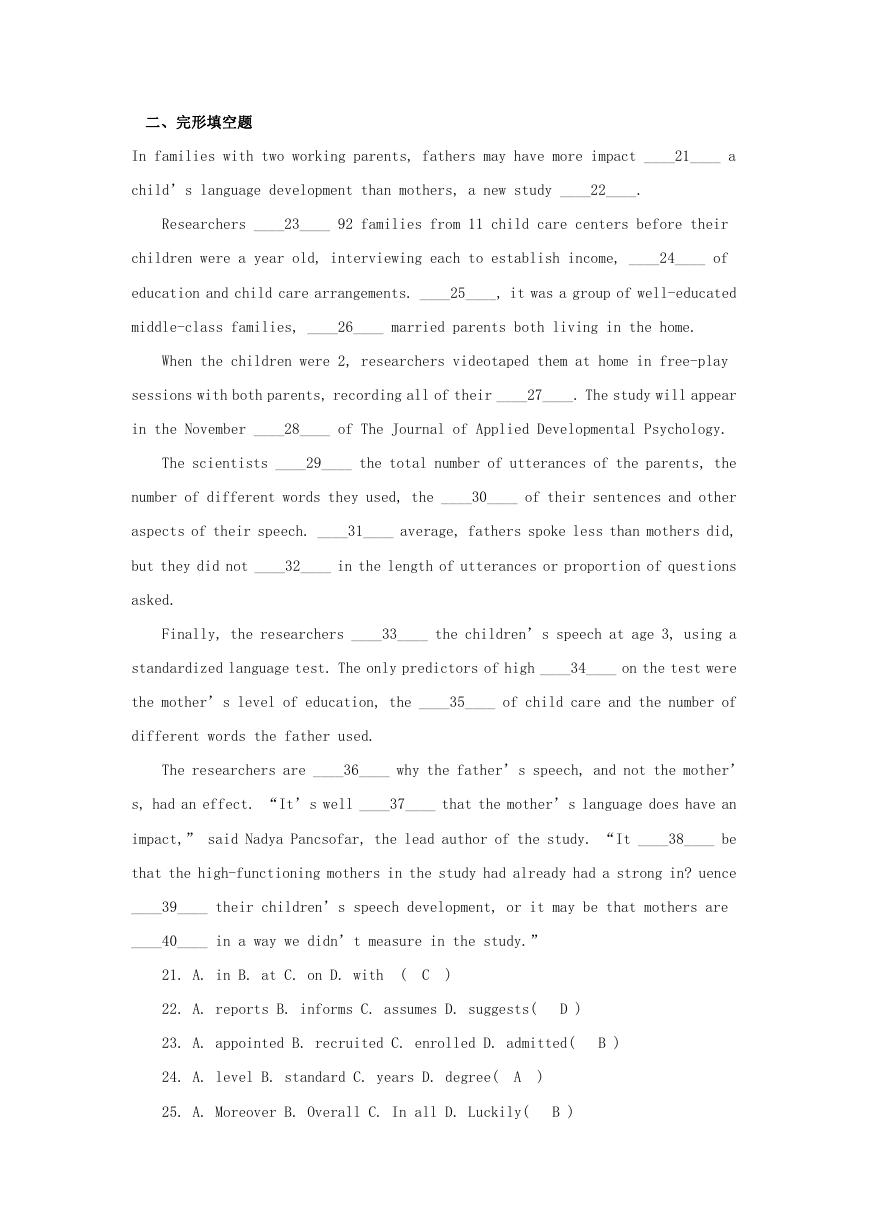
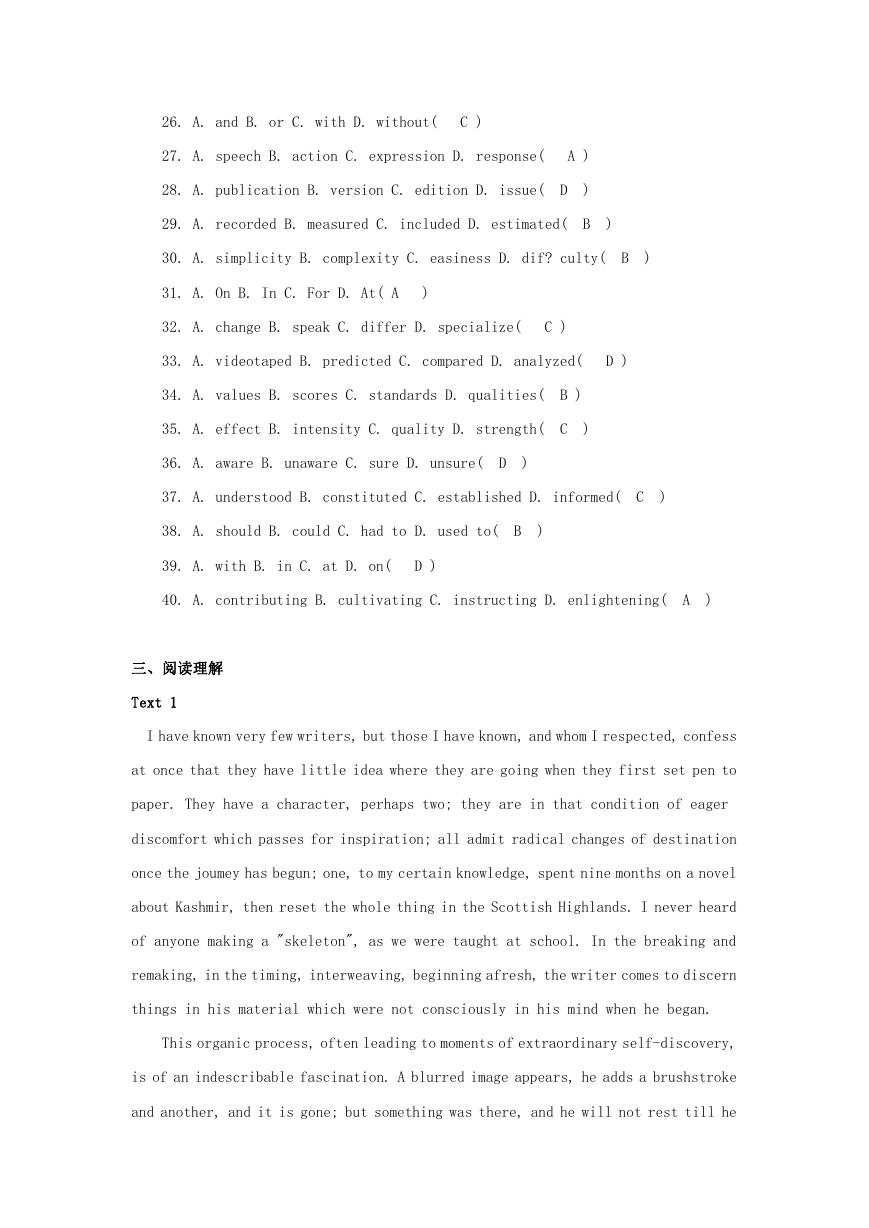
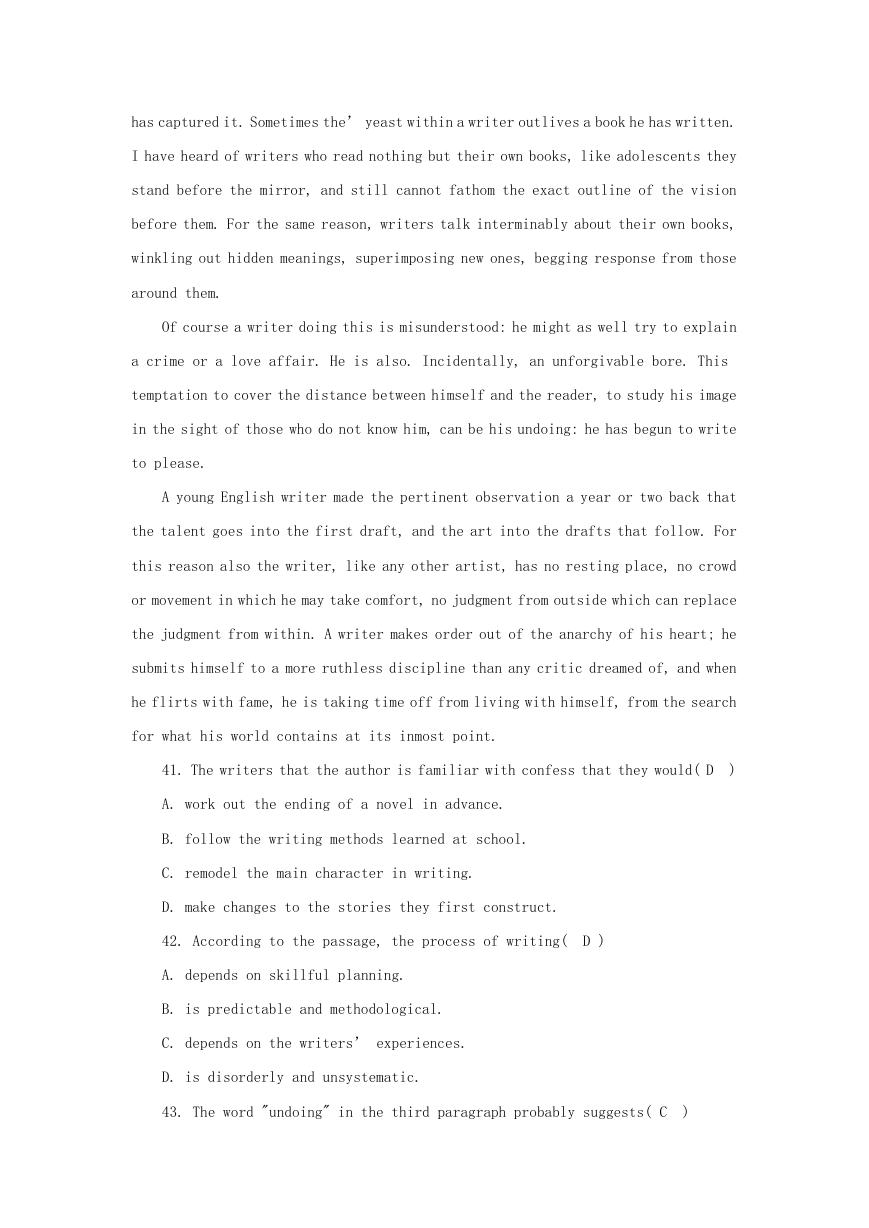
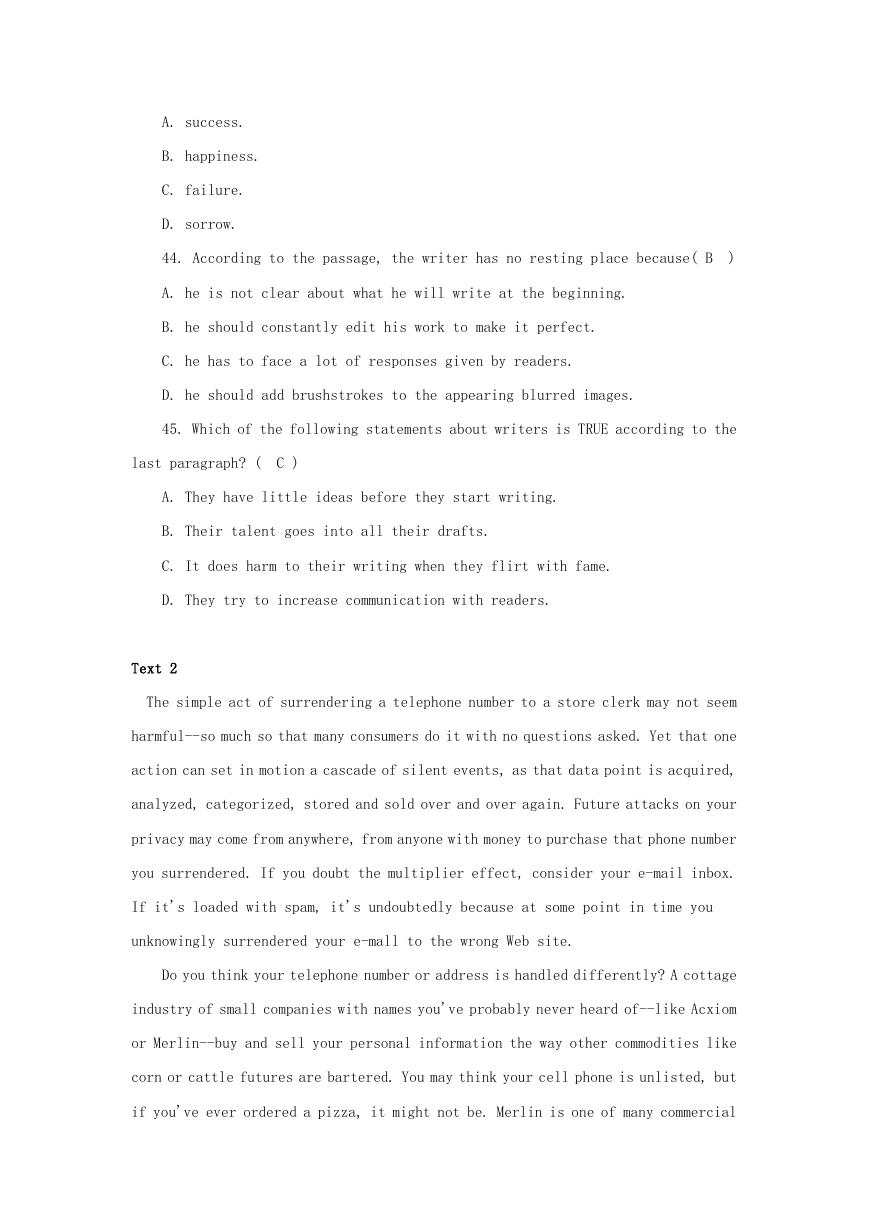
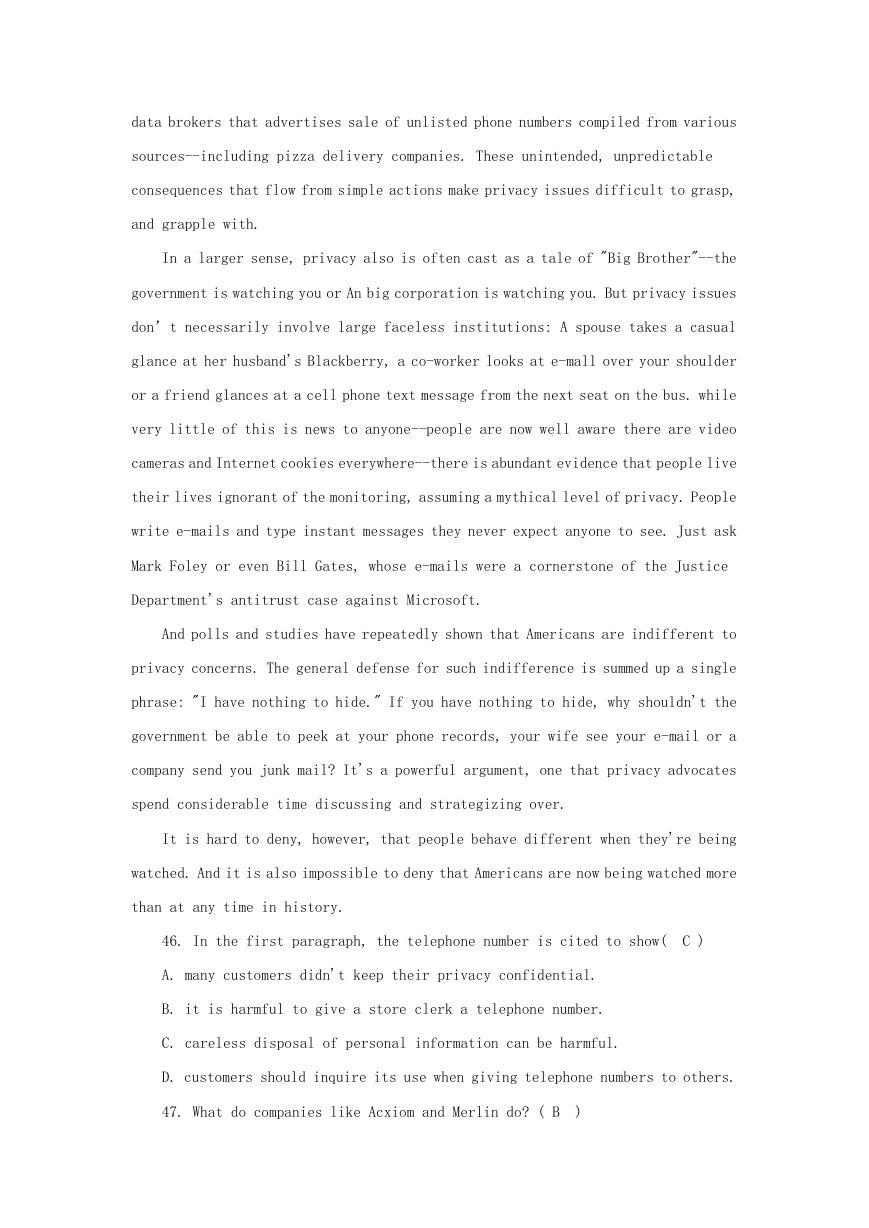
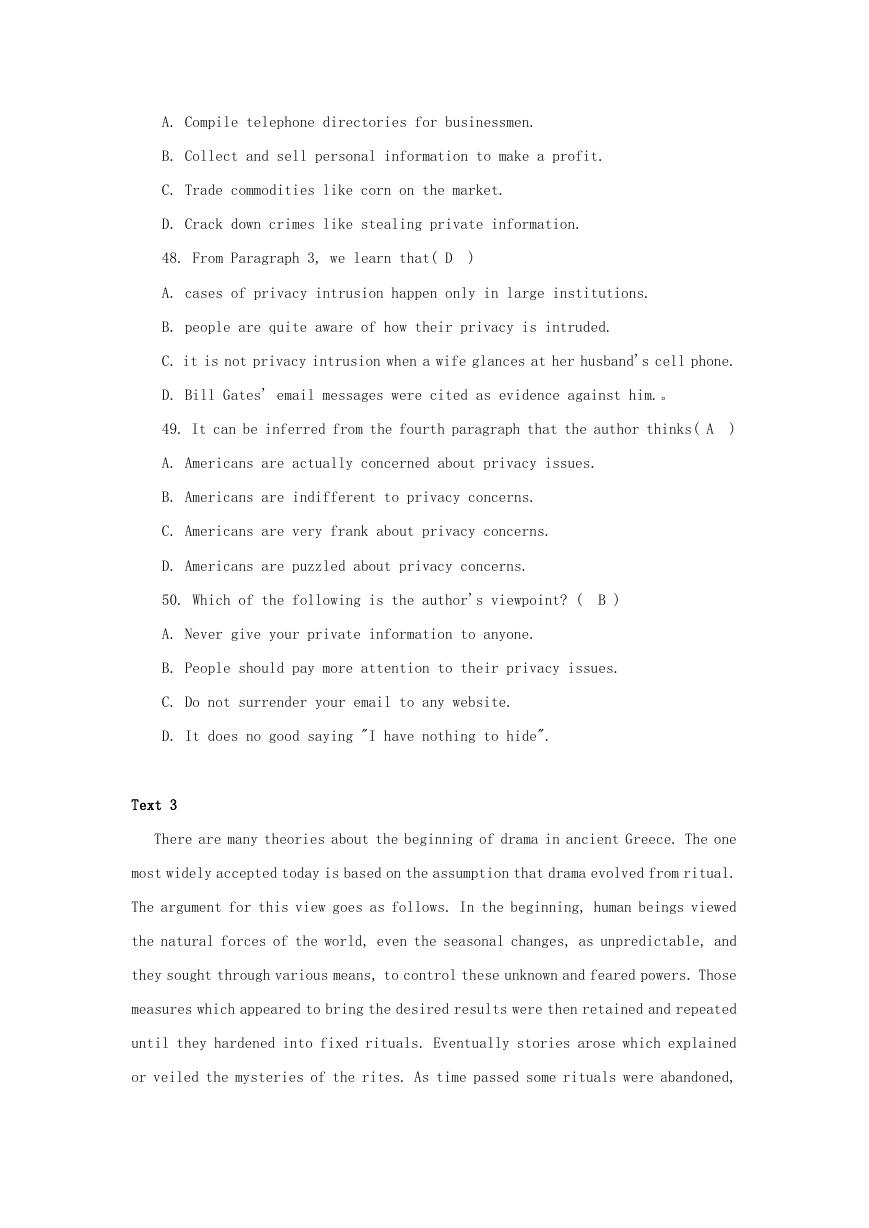








 2023年江西萍乡中考道德与法治真题及答案.doc
2023年江西萍乡中考道德与法治真题及答案.doc 2012年重庆南川中考生物真题及答案.doc
2012年重庆南川中考生物真题及答案.doc 2013年江西师范大学地理学综合及文艺理论基础考研真题.doc
2013年江西师范大学地理学综合及文艺理论基础考研真题.doc 2020年四川甘孜小升初语文真题及答案I卷.doc
2020年四川甘孜小升初语文真题及答案I卷.doc 2020年注册岩土工程师专业基础考试真题及答案.doc
2020年注册岩土工程师专业基础考试真题及答案.doc 2023-2024学年福建省厦门市九年级上学期数学月考试题及答案.doc
2023-2024学年福建省厦门市九年级上学期数学月考试题及答案.doc 2021-2022学年辽宁省沈阳市大东区九年级上学期语文期末试题及答案.doc
2021-2022学年辽宁省沈阳市大东区九年级上学期语文期末试题及答案.doc 2022-2023学年北京东城区初三第一学期物理期末试卷及答案.doc
2022-2023学年北京东城区初三第一学期物理期末试卷及答案.doc 2018上半年江西教师资格初中地理学科知识与教学能力真题及答案.doc
2018上半年江西教师资格初中地理学科知识与教学能力真题及答案.doc 2012年河北国家公务员申论考试真题及答案-省级.doc
2012年河北国家公务员申论考试真题及答案-省级.doc 2020-2021学年江苏省扬州市江都区邵樊片九年级上学期数学第一次质量检测试题及答案.doc
2020-2021学年江苏省扬州市江都区邵樊片九年级上学期数学第一次质量检测试题及答案.doc 2022下半年黑龙江教师资格证中学综合素质真题及答案.doc
2022下半年黑龙江教师资格证中学综合素质真题及答案.doc